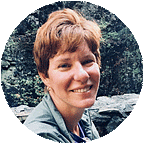Course Review: EFA’s Book Mapping for Developmental Editors
I balanced on the edge of an office chair and waited impatiently for my manager to take a seat across the conference table from me. Without preamble, I delivered the lines I had rehearsed on my drive to work that morning:
“I’m leaving the company to focus on my freelance writing and developmental editing career. I’m going to focus on helping authors with their books.”
I was banking on the fact that my manager was sufficiently unfamiliar with the writing profession and such jargon would make her believe this whopper, even if I didn’t believe it myself. As exciting as a future in freelance editing sounded, it seemed like a flimsy fairy tale to me.
“What’s on the horizon?” a coworker asked me once word got out I was leaving.
I shrugged. “A little of this, a little of that.”
I felt like a fraud, certain that everyone was shaking their heads at how I couldn’t keep up in the race to enter data and file paperwork. Without another job offer lined up, perhaps they thought I would sink into some sort of unemployed oblivion.
Within days of leaving my job, I saw that the Editorial Freelancers Association was offering a course called Book Mapping for Developmental Editors. The timing was perfect, but I hesitated. The year before, I had started a different EFA course. With no schedule, feedback, or interaction with my instructor or other students, I had lost interest in that particular self-study course. I still wanted to pursue developmental editing, though, so I decided to give the EFA one more shot.
It sounds like a cliché but that decision was life-changing. Here is a review of my experience.
The Instructor
Before starting the weekly lessons, I took a little detour to Heidi Fiedler’s website and browsed the resources there. I was encouraged to find she not only knew her stuff but she was passionate about helping writers and editors.
As we delved into our first week of class, I was already impressed with Heidi’s knowledge. She was actively involved throughout the course, providing thought-provoking questions and thorough feedback for each student. She was not just going through the motions; it was clear that she cared about our progress.
The Materials
Heidi’s visual approach to learning sometimes made me forget I was studying. Her course materials, like the resources on her website, have an unmistakably entertaining style that is easy to absorb. I’ve hungrily hoarded each PDF lesson for future reference.
In addition, Heidi chatted about the lessons in optional, prerecorded videos each week. Earbuds in place, I sipped coffee at my local Starbucks as I watched these videos.
That’s not to say that the course was a breeze. Book mapping is not a science, and there is no answer guide. There were times I struggled with how to wrangle the manuscript I had chosen to work on, and I changed my book map format at one point to make it more accessible to the author. The more time and effort I put in, the harder it got and the more I understood the process.
Heidi provided enough links to additional resources that I had to force myself to step back from time to time or become overwhelmed. I had barely dipped into the sea of information about book mapping, and I will continue to navigate these resources in years to come.
The Discussion Forums
On the first day, I tentatively posted an introduction in a discussion forum, wondering how crucial the discussions would be to my learning. Feeling bolder as I got into the first week, I posted a few questions to the group. I was encouraged to find my classmates were genuinely eager to share ideas and to support one another.
By the second week, we were reviewing each other’s work. As one of the least experienced members of the class, I sometimes felt guilty for receiving more advice from my classmates than I was able to give them. But I gratefully accepted it all the same. We discussed the book mapping process as well as professional concerns about marketing and charging for our services. It was a relief to have found other professionals who understood my journey.
Outside class, I still felt like an unemployed drifter, taking up space in my backyard hammock. But in the discussion forums, Heidi and my classmates showed me that I was on the right track. It turned out I was good at book mapping. My new peers cheered me along, helping me see my future in developmental editing as fact, not fiction.
My New Reality
By the end of class, I was brimming with ideas, and I announced to friends the kind of services I was offering. My plan no longer felt like a lie, as it had just a month earlier when I spoke with my manager. I was confident that I was cultivating the skills and the wisdom to help authors develop their stories. I’ve made connections that I hope will last throughout my career.
I have a lot of work ahead of me and I will probably take another part-time job while I acquire new clients. But that job doesn’t have to define me now that I have glimpsed my true potential. I have a world of options. I just needed to take a risk.
Author’s Notes: Although I am a member of the EFA, this is not a sponsored post. These opinions are solely my own. Special thanks to my good friend and copy editor Erin Wright for her support.
